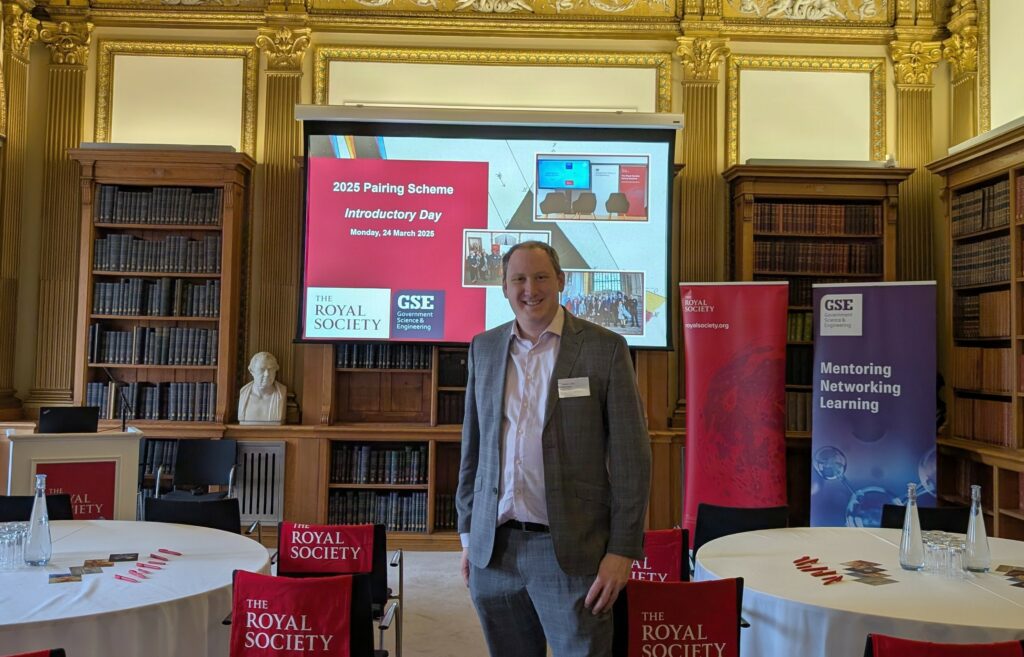This week (24 – 27 March), 30 UK scientists will swap places with politicians and civil servants for four days, exploring the world of politics as part of the annual Royal Society Pairing Scheme.
The scheme has been running since 2001 in partnership with the Government Office for Science’s GSE Profession Team. It aims to help build relationships between scientists and politicians, ensuring that policymakers can make decisions based on the best scientific evidence.

The scheme takes place in the week that Chancellor Rachel Reeves will give her Spring Statement, at a time when the role of science and innovation in driving economic growth has never been more important.
Professor John Collomosse from the University of Surrey’s Centre for Vision, Speech and Signal Processing (CVSSP) has been paired with the Department for Science, Innovation and Technology (DSIT) policy and capability team in AI and Disinformation.
Professor Collomosse is a world-leading expert in this topic, having been involved in the formation of the cross-industry Content Authenticity Initiative at Adobe and leading the UKRI/EPSRC’s Centre for the Decentralised Digital Economy (DECaDE), part of CVSSP to develop technologies and policy recommendations to fight fake news and disinformation. CVSSP’s research has helped the University of Surrey stay ranked as the UK’s top university for Computer Vision since records began.
“Disinformation and online harms are major societal challenges that we’ve been addressing head on with DECaDE’s multi-year research programme in media provenance and content authenticity. I’m delighted that the Royal Society has paired me with the DSIT team responsible for the UK government’s policy and capability in AI and disinformation. This is an exciting opportunity to amplify the impact of our research to benefit the public good.”
Professor John Collomosse, Professor of Computer Vision and AI | Director DECaDE: UKRI/EPSRC Centre for the Decentralised Digital Economy
Scientists taking part this year are drawn from universities and research institutes across the UK, including the University of Loughborough, UCL Cancer Institute, and the University of Edinburgh.
They will be shadowing a range of parliamentarians and civil servants, including five newly elected MPs: Jayne Kirkham, Dr Scott Arthur, Laurence Turner, Ian Sollom, and Adam Thompson.
Other parliamentarians include Baroness Sheehan, Lords Chair of the Environment and Climate Change Committee; Lord Clement-Jones, Lords Spokesperson for the Digital Economy; and Baroness Bennett of Manor Castle, former Leader of the Green Party of England and Wales.
Over the course of the week, scientists will get a behind-the-scenes insight into how policy is formed, shadowing a policy maker to learn about their work and how they can best share their expertise.
On Wednesday evening, a Parliamentary reception with speeches from Baroness Brown of Cambridge FRS; Sir Adrian Smith, President of the Royal Society; and Chi Onwurah MP, Chair of the House of Commons Science, Innovation and Technology Committee.
The scheme will continue later in the year when parliamentarians visit their scientist pairs at their home institutions.
Sir Adrian Smith, President of the Royal Society, said:
“At a time when science and scientists are under threat around the globe, programmes such as the Royal Society Pairing Scheme have never been more important. We must continue to strengthen links between scientists and policymakers. Having this group of UK scientists in Westminster to develop their understanding of policy making and share their expertise to shape it can help ensure research is translated into policy that improves lives.”
NOTES FOR EDITORS
- Previous participants of the pairing scheme include Prime Minister Sir Keir Starmer, Greg Clark, former Chair of the Commons Science and Technology Committee, Nick Clegg, former Deputy Prime Minister, and Caroline Lucas MP, former Leader of the Green Party.
- Further information about the Royal Society Pairing Scheme, as well as case studies, can be found at the following link.
- The Royal Society is a self-governing Fellowship of many of the world’s most distinguished scientists drawn from all areas of science, engineering, and medicine. The Society’s fundamental purpose, as it has been since its foundation in 1660, is to recognise, promote, and support excellence in science and to encourage the development and use of science for the benefit of humanity. http://royalsociety.org/
Follow the Royal Society on X (@royalsociety), Bluesky (@royalsociety) or on Facebook (facebook.com/theroyalsociety) - The scheme is supported by the Government Science & Engineering (GSE) Profession, managed from within The Government Office for Science. The Government Office for Science ensures that government policies and decisions are informed by the best scientific evidence and strategic long-term thinking. It is led by the Government’s Chief Scientific Adviser, Dame Angela McLean, who advises the Prime Minister and Cabinet on all scientific matters.
- The Government Office for Science is responsible for giving scientific advice to the Prime Minister and members of the Cabinet, through a programme of projects that reflect the priorities of the government, ensuring and improving the quality and use of scientific evidence and advice in government (through advice and projects and by creating and supporting connections between officials and the scientific community), providing the best scientific advice in the case of emergencies, through the Scientific Advisory Group for Emergencies (SAGE) and helping the independent Council for Science and Technology provide high level advice to the Prime Minister.

